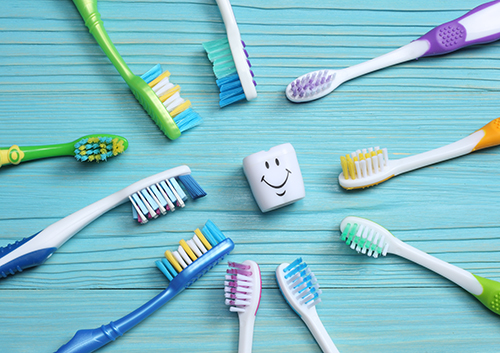Sippy Cups
April 30th, 2025

What a milestone! The transition from bottle to sippy cup is one of baby’s first steps toward toddler independence. And like all first journeys, some helpful guideposts come in handy. That’s why Dr. Ghenta and our team have several recommendations to help you navigate this transition, making sure your baby’s dental health is protected along the way.
Choosing a Sippy Cup
Sippy cups are often a parent’s first choice for this big step in baby’s development. While sippy cups offer a variety of child-safe materials, lively colors, and comfortable handle options, the feature of interest from a dental perspective is lid design.
Sippy cups curb spills because their lids don’t allow liquids to flow out freely, ensuring that drinks make it into baby’s mouth instead of onto furniture or floor. Cup lids might incorporate:
- Built-in straws
- A drinking edge around the rim of the cup which seals when your child isn’t drinking
- Soft spouts
- Hard spouts
- Spouts with valves to prevent liquids from leaking out. (Spouts with valves work like a nipple, which means baby is sucking instead of sipping.)
Which design is best? For short periods, any of these designs can work for you. Over long periods, spouted cups could have the same effects as prolonged thumb-sucking and pacifier use, potentially affecting a child’s tongue positioning, tooth alignment, bite, and speech development. Your dentist will be able to suggest which cups are best for your child’s dental health both short and long term.
What to Put in a Sippy Cup
Once your baby has begun drinking from a cup, it should only hold tooth-friendly drinks.
- Pediatricians generally recommend breast milk and/or formula until your child is 12 months old. You can switch to regular milk (or a healthy milk alternative) once your child is a year old with your doctor’s okay.
- Water can be introduced when your pediatrician thinks your child is ready, usually around the age of six months.
- Because even natural fruit juices have lots of sugar, dentists and pediatricians suggest giving your baby small amounts only—or feed your child fruit instead!
- Skip the sugared drinks, sports drinks, caffeinated drinks, and sodas. They aren’t healthy for little bodies or little teeth.
Help Prevent Tooth Decay
Just like adults, babies can suffer tooth decay, too—and for the same reasons. The bacteria in plaque use the sugars found in our diets to create acids, and acids erode tooth enamel.
When a toddler totes a sippy cup around all day, even filled with healthy drinks, those baby teeth are constantly exposed to the natural sugars found in breast milk, formula, and, for older children, milk. Drinks with more or added sugars, such as juices or sweetened drinks, cause more damage to tooth enamel. Use a sippy cup wisely:
- Offer the cup with meals and snacks, when increased saliva production can help wash away sugars and neutralize the acids which cause cavities.
- Offer water between meals.
- Don’t let your baby take a sippy cup to bed. Some spill-proof cups are designed to be sucked like bottles, and, like bottles, sugary liquids can pool in babies’ mouths as they sleep.
- Get into a tooth-cleaning routine as soon as your child’s teeth start to arrive.
And, while we’re talking about healthy teeth, please don’t let your child toddle around with a sippy cup. A fall while drinking can injure a baby’s mouth and teeth.
Partner with Your Child’s Dentist
The journey from baby to toddler can seem overwhelming sometimes for both you and your child, but you have expert help available! It's a good idea to make a first dental appointment at our Dartmouth, MA office sometime between the appearance of the first baby tooth and your child’s first birthday. This initial visit is an opportunity for Dr. Ghenta to:
- Check your child’s overall dental health and development.
- Look for signs of early decay.
- Talk about proactive dental care, including how and when to clean your child’s teeth.
- Answer questions about how you can support your child’s dental health, including the advantages and disadvantages of sippy cups.
Used properly, sippy cups can be a helpful transition on your child’s journey from bottle to cup, and from baby-who-relies-on-you-for-everything to take-charge-toddler. Dr. Ghenta and our team are an ideal guide as you and your child chart this path together.





 Website Powered by Sesame 24-7™
Website Powered by Sesame 24-7™